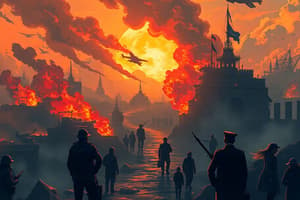Podcast
Questions and Answers
What was one major outcome of the Cold War?
What was one major outcome of the Cold War?
- A direct military confrontation between the United States and the Soviet Union.
- Tensions and indirect conflicts between the United States and the Soviet Union. (correct)
- The establishment of democratic governments in Eastern Europe.
- Complete disarmament of nuclear weapons worldwide.
Which event marked the beginning of the nuclear era?
Which event marked the beginning of the nuclear era?
- The Treaty of Potsdam.
- The formation of the United Nations.
- The emergence of the United States as a superpower.
- The atomic bombings of Hiroshima and Nagasaki. (correct)
What was one consequence of decolonization after World War II?
What was one consequence of decolonization after World War II?
- Strengthening of colonial empires in Europe.
- Uniform acceptance of democratic governance in former colonies.
- An increase in nationalist movements in various regions. (correct)
- The immediate economic stability of newly independent nations.
What impact did the Marshall Plan have on Europe post-World War II?
What impact did the Marshall Plan have on Europe post-World War II?
What significant judicial event aimed to hold Nazi leaders accountable for war crimes?
What significant judicial event aimed to hold Nazi leaders accountable for war crimes?
Flashcards are hidden until you start studying
Study Notes
Consecuencias Históricas de la Segunda Guerra Mundial
-
Reconfiguración Geopolítica:
- Emergence of the United States and la Unión Soviética como superpotencias.
- División de Europa en bloques: Occidente y el bloque soviético.
-
Guerra Fría:
- Tensión y conflictos indirectos entre EUA y la URSS.
- Competencia ideológica entre capitalismo y comunismo.
-
Descolonización:
- Aceleración de movimientos independentistas en Asia, África y el Medio Oriente.
- Fin de imperios coloniales europeos.
-
Creación de Instituciones Internacionales:
- Formación de la Organización de las Naciones Unidas (ONU) en 1945.
- Establecimiento de mecanismos para promover la paz y la cooperación internacional.
-
Nuevas Fronteras y Tratados:
- Redefinición de fronteras en Europa y Asia.
- Acuerdos como el Tratado de Potsdam y la Conferencia de Yalta.
-
Desarrollo Tecnológico y Militar:
- Innovaciones en tecnología militar (ej. cohetes, aviación).
- Inicio de la era nuclear tras el bombardeo atómico de Hiroshima y Nagasaki.
-
Efectos Sociales y Políticos:
- Emergence de movimientos por los derechos civiles y sociales en diversas naciones.
- Cambios en las estructuras de poder y en la política interna de muchos países.
-
Impacto Económico:
- Reconstrucción económica en Europa, a través del Plan Marshall.
- Comienzo de la integración económica en Europa, llevando eventualmente a la Unión Europea.
-
Memoria y Cultura:
- Creación de memoriales y museos para recordar los horrores de la guerra.
- Cambios en la representación cultural, reflejando los traumas de la guerra.
-
Juicio a Crímenes de Guerra:
- Juicios de Núremberg con el objetivo de juzgar a los líderes nazis.
- Establecimiento del concepto de crímenes de guerra y responsabilidad individual.
Estas consecuencias han moldeado el mundo contemporáneo y continúan influyendo en las relaciones internacionales y las políticas actuales.
Geopolitical Restructuring
- The Second World War witnessed the rise of the United States and the Soviet Union as superpowers.
- The division of Europe into Western and Eastern blocs was a direct consequence of the war, setting the stage for the Cold War.
Cold War
- Characterized by tension and indirect conflicts between the United States and the Soviet Union.
- Marked by ideological competition between capitalism and communism.
Decolonization
- The war accelerated independence movements in Asia, Africa, and the Middle East, leading to the collapse of European colonial empires.
International Organizations
- The United Nations (UN) was formed in 1945 as a means to promote international peace and cooperation.
New Borders and Treaties
- Wartime agreements like the Potsdam Agreement and the Yalta Conference redefined borders in Europe and Asia.
Technological and Military Advancements
- Innovations in military technology, including rockets and aviation, emerged as a result of the war.
- The atomic bombing of Hiroshima and Nagasaki marked the beginning of the nuclear age.
Social and Political Impacts
- The war gave impetus to civil rights and social movements worldwide.
- It also resulted in significant changes to power structures and internal politics across various nations.
Economic Impact
- The Marshall Plan facilitated economic reconstruction in Europe.
- The war led to the onset of European economic integration, eventually culminating in the European Union.
Memory and Culture
- The war prompted the creation of memorials and museums to commemorate its horrors.
- Cultural representations underwent transformations, reflecting the trauma of the conflict.
War Crime Trials
- The Nuremberg Trials were established to prosecute Nazi leaders for war crimes.
- The concept of war crimes and individual responsibility was established.
Studying That Suits You
Use AI to generate personalized quizzes and flashcards to suit your learning preferences.




